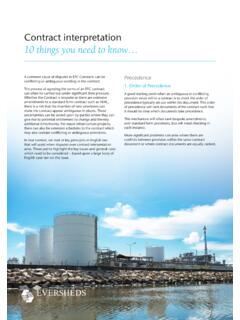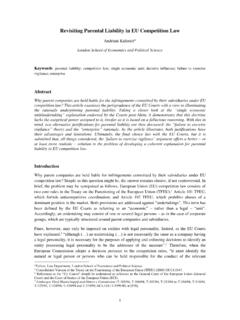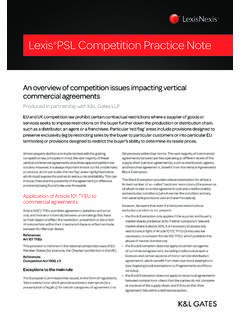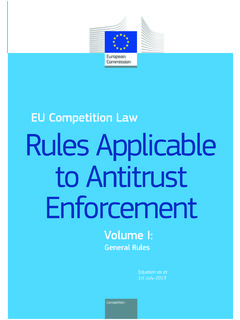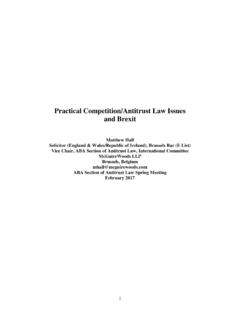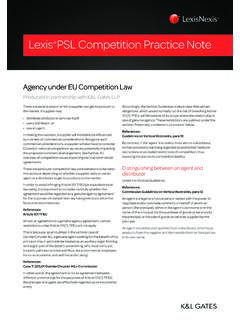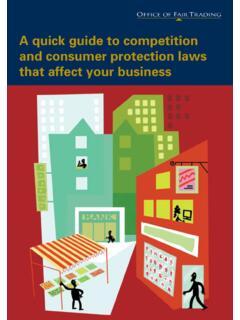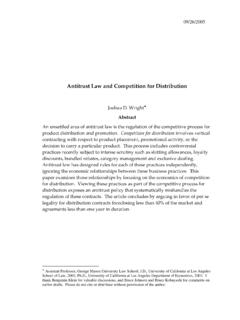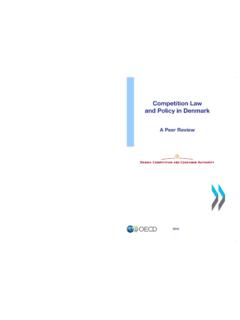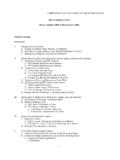Transcription of EU and Swiss Competition Law: Navigating the Boundaries
1 136 SZW/RSDA 2/2012EU and Swiss Competition Law: Navigating the BoundariesBy Suzanne Rab, Ilyse Stempler and Gerald Brei*Though Switzerland is not a member of the European Union (EU), its proximity to and relationship with the EU economy necessitate that businesses and counsel for entities with Swiss and EU operations consider both Swiss and EU law, especially in the realm of Competition law. European Competition law protects European competitive markets and, thus, any com-pany whose activities affect Europe has to be aware of, and comply with, the EU rules even where it has no direct presence in the EU. Many Swiss corpora-tions sell products in the EU, partner with EU com-panies, and may seek to merge with companies active in the EU. Though the European Commission (EC) does not have formal enforcement jurisdiction over Swiss entities, it can enforce a decision against a Swiss company, for example, by levying a fine against such company or its EU-based affiliates, ordering a modification of business practices that are imple-mented in the EU or prohibiting a merger between a Swiss company and another corporation from being consummated.
2 Over the past several years, the EC has investigated Swiss corporations for cartel behav-ior and evaluated potential mergers involving Swiss companies. Swiss Competition law resembles EU Competition law in many respects. Since the passage of the Federal Act on Cartels and Other Restraints of Competition (ACart) in 1995, the Swiss government has amended ACart several times, each time bringing ACart closer in line with EU Competition law. Currently, the Swiss government is debating further changes to Switzer-land s Competition regime. In 2010 and 2011, the Federal Government suggested several changes to Swiss Competition law, including inter alia a restruc-turing of Switzerland s Competition Commission (Comco), changes to sanctions for violations, and in-creased cooperation with the EC on enforcement. In addition, over the summer of 2011, Comco provided new guidance to simplify the filing process for merg-ers that do not meet certain criteria.
3 Table of contentsI. Relationship between EU and Swiss Competition law1. EU and Swiss Competition regimes2. Cooperation between EU and Swiss Competition authorities3. Recent EU cases involving Swiss companiesII. Convergence between EU Competition law and ACart1. 2003 revisions2. Recent changes on vertical agreements3. Current Swiss proposals for future amendments4. Continued differences between EU and Swiss Competition lawIII. Attorney-client privilege and in-house counselIV. Hot topics in EU and Swiss Competition law1. Challenging EC requests for information2. Financial services3. Pharmaceutical industryV. ConclusionI. Relationship between EU and Swiss Competition law1. EU and Swiss Competition regimesComco is the national Competition authority of Switzerland. It has jurisdiction to enforce the provi sions of ACart and is supported by an investigatory body, the Secretariat. ACart governs (1) agreements between undertakings affecting Competition ; (2) abuse of a dominant position; and (3) mergers.
4 Since ACart s passage, it has been revised multiple times to make it more closely aligned to the EU s rules on Competition law. ACart gives Comco jurisdiction over those entities and activities that have an effect on the market in Switzerland, be they Swiss or non Swiss entities. EU Competition law, similarly, covers cartels, abuse of a dominant position, and Unique to the EU, EU Competition law also applies to state Based on Article 105 TFEU, the EC has the duty to ensure the application of the principles laid down in Article 101 TFEU on restrictive agreements and * The authors law firms have represented or represent cli ents in some of the cases mentioned in this See Articles 101 and 102 of the Treaty on the Functioning of the European Union (TFEU) and Council Regulation 139/2004 EC (the Merger Regulation).2 See Article 107 of the TFEU. State aid refers to the support member states give to national companies. Article 107 TFEU prohibits member states from providing aid or sub sidizing a business undertaking that affects trade between the member states unless it falls under a specified exemp tion or is otherwise compatible with the internal market.
5 SZW/RSDA 2/2012 137 KurzbeitragArticle 102 TFEU on abuse of a dominant position and to investigate cases of suspected EU Competition law does not specifically define the breadth of its application in terms of terri torial scope or the nationality of companies, Article 101 TFEU states that the EC has jurisdiction over ac tivities .. which may affect trade between member states and which have as their object or effect the pre vention, restriction or distortion of Competition within the internal market .. 3. Accordingly, the EC has taken a broad view of its scope and authority and frequently applied its Competition law to non EU en tities whose activities may have an effect on or are implemented in the EU market. As former Commis sioner Sir Leon Brittan commented with regard to one of the early cases involving non EU companies, the location of a party s incorporation or headquar ters is immaterial for Competition Law, which must focus on impact on EU s substantially revised modernised com petition law went into effect in May While much of the substance remained the same, the new regulations decentralised authority for enforcing EU laws giving member states and national courts a greater role in enforcement.
6 The EC and national Competition authorities often act in parallel and share intelligence about potential infringements of compe tition law, particularly where transactions cross into several jurisdictions. Article 20 of Regulation 1/2003 grants the EC extensive investigative powers, in clud ing the power to carry out dawn raids on the premises of undertakings and in certain circumstances indi viduals private In addition, the Court of Jus 3 Article 101 Leon Brittan, Competition Policy and the Merger Control in the Single European Market (1991), See Council Regulation (EC) No 1/2003 of 16 December 2002 on the implementation of the rules on Competition laid down in Articles 81 and 82 of the Treaty, OJ L 1/1 of 4 January 2003 (hereinafter Regulation 1/2003 ).6 Article 20(2) of Council Regulation (EC) No 1 2003 of 16 December 2002: The officials and other accompanying persons authorised by the Commission to conduct an inspection are empow ered:(a) to enter any premises, land and means of transport of undertakings and undertakings;(b) to examine the books and other records related to the business, irrespective of the medium on which they are stored;(c) to take or obtain in any form copies of or extracts from such books or records;tice of the European Union (CJEU) held that private citizens and businesses who suffer harm as a result of a breach of EU Competition laws may bring a private action against and obtain reparation from the party who caused the Thus, individual member states, the EC, and private entities may raise and bring actions against Swiss entities that conduct busi ness in member states.
7 2. Cooperation between EU and Swiss Competition authorities Though Switzerland participates in the OECD Competition Commission and in the International Competition Network (ICN), it does not have any bi lateral or multilateral agreements to cooperate on Competition matters. Thus, Swiss Competition au thorities currently do not benefit from the network of national Competition authorities within the EU re ferred to as the European Competition Network or ECN . It has on occasion operated on an informal case by case basis with the EU. However, because there is no formal legal agreement to share informa tion, the EC and Swiss Competition authorities can not exchange confidential information. There are, however, signs that increased cooperation is on the horizon. In August 2010, the Swiss government ap proved a mandate to negotiate an agreement with the EU to encourage and formalise cooperation between their respective Competition authorities.
8 Switzerland and the EU formally initiated negotiations for an agreement on cooperation between their Competition authorities in March 2011 with the goal of facilitating the implementation of cartel laws and exchanging confidential information. According to sources close to the negotiations, a draft agreement has been reached. Subject to internal approval procedures and (d) to seal any business premises and books or records for the period and to the extent necessary for the ins pec tion;(e) to ask any representative or member of staff of the undertaking or association of undertakings for expla nations on facts or documents relating to the subject matter and purpose of the inspection and to record the answers. 7 See Case C 453/99, Courage Ltd v. Bernard Crehan and Bernard Crehan v. Courage Ltd and Others, para 26 27 (20 September 2001); Cases C 295/04 to C 298/04, Manfredi v. Lloyd Adriatico Assicurazioni SpA, para 61 (13 July 2008).138 SZW/RSDA 2/2012 Kurzbeitragformal ratification obligations, it is expected that the agreement will enter into force some time during the year 2012.
9 3. Recent EU cases involving Swiss companiesEU jurisdiction over Swiss corporations is not hy pothetical. In 1999, Swiss pharmaceutical corpora tion, Hoffmann La Roche, was the worldwide market leader in vitamins, with a reported market share of approximately 50%. Between 1991 and 1999, the company was found to have participated in an unlaw ful price fixing cartel for vitamins. Hoffmann La Ro che pled guilty in the and paid a US $500 million fine, then the largest fine ever secured in the for an antitrust Two years later in 2001, the EC fined Hoffmann La Roche EUR 462 million for the same infraction, also a record fine at the In addition to the Hoffmann-La Roche case, the EU has investigated and fined several Swiss compa nies for cartel behavior. For example, the EU General Court (General Court)10 upheld fines against several thread producers for operating a cartel between 1990 and 2001, including Switzerland s Zwicky, which was fined EUR 174 Later that decade in 2008 and 2009, EC antitrust regulators raided the Euro pean offices of cement maker Holcim AG, a Swiss company, as well as other cement companies as part of a price fixing probe.
10 Holcim is currently appealing the EC s investigatory procedures, an action dis cussed in further detail in Chapter IV. Switzerland s ABB has been involved in several EC investigations relating to cartel behavior. In 2007, the EC fined Siemens EUR 396 million for its role in fixing prices with several companies in the market for gas insulated switchgear. ABB escaped a fine for act ing as a whistleblower and informing the EC about the cartel Two years later, the situation 8 Department of Justice Press Release, F. Hoffmann La Roche and BASF Agree to Pay Record Criminal Fines for Participating in International Vitamin Cartel F. Hoffmann La Roche Agrees to Pay $500 Million, Highest Criminal Fine Ever (20 May 1999).9 EC Press Release, Commission imposes fines on vitamin cartels (12 November 2001). 10 Formerly, the Court of First Joined Cases T 456/05 and T 457/05, G termann and Zwicky v. Commission (28 April 2010).12 EC Press Release, Competition : Commission fines mem bers of gas insulated switchgear cartel over 750 million euros (24 January 2007).

